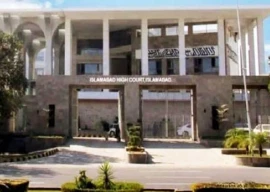
The commission stated that the early celebration was held to facilitate a large number of people who cannot attend the events on a Sunday.
These individuals therefore banded together in front of Mr Books in F-6 Markaz for this purpose and remembered the protest which took place at Mall Road in Lahore on February 12, 1983.
The 1983 protest was held against the repressive law of evidence, under which a woman’s testimony was considered as half of a man’s. The participants, both men and women, were subject to fierce baton charges by the police, but did not stop the protest.
Speaking at the gathering, which grew to around 100 people, former MNA Marvi Memon said, “On this day, men and women were both subjected to equal coercive aggression and repression. However, the sad part is that it was the only time when men and women were treated equally in Pakistan.”
In addition to that, prominent personalities, including Hasan Nasir, J Salik, Jehangir Akhtar and Marvi Samad noted that women’s contributions to the country have not been acknowledged, due to which the country has not been able to develop.
Rabia, a researcher at Quaid-i-Azam University (QAU), said, “I feel it is selfish to think of women’s rights as solely an economical issue.”
“Pursuing equality to increase GDP is equivalent to using women like the government and society are already doing, with wages being the only difference,” she added.
She further said that women are expected to tend to the home in addition to work. At the same time, they are expected to rear children on their own, even though the father should share equal responsibility.
Human rights activist Azam Kundi said, “Women rights and economic development are positively correlated. If women want empowerment, they need to be financially independent first.”
Refreshingly, much of the debate took place during the stand-in, which is usually not the case at such events.
Objecting to the speakers’ reference to women as mothers, daughters, sisters and wives, Gul Naz, a participant, commented, “This is the problem right here; viewing women in terms of their relationships, particularly with men. What about the working woman, the woman who is ostracised if she is barren, or the woman who chooses to be independent and free spirited?”
The size of the gathering was respectable, given that it was arranged and announced the night before. However, the irony of the lack of commemoration on the official day was noted by participants, who felt it to be “disheartening”.
Aisha, a participant, commented, “There have been so many celebrations all week, but none on the actual day, showing the light weight with which it is considered. There is no need to fulfil mere formalities and show remembrance for an hour or so if one doesn’t really care for the cause.”
Indeed, it is thought provoking how change and social equality can actually take place if real support for the cause is not present. That being said, it is a ray of light that some individuals are trying their best to not only bring about change, but also tom show respect to those who fought before them.
The event was organised by Coalition for Citizen’s Rights, Pattan Development Organisation, Women Councillors Network, Free and Fair Election Network, QAU’s Gender Studies Centre and Women’s Action Forum.
Published in The Express Tribune, February 13th, 2012.












































COMMENTS
Comments are moderated and generally will be posted if they are on-topic and not abusive.
For more information, please see our Comments FAQ